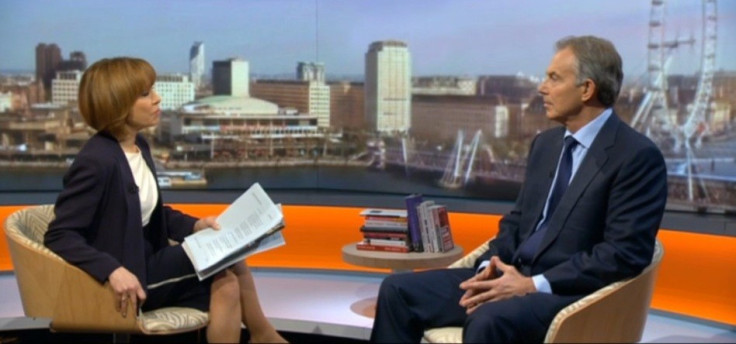Tony Blair Backs David Cameron Over French Action in Mali

Tony Blair has publicly backed David Cameron's support for the French military intervention in Mali.
Blair said the struggle would be "long, difficult and messy" and could take "a generation", but warned that the situation would become "more complex and more serious" if the west failed to act.
"In Mali, France is absolutely right. It is very courageous of President Hollande to go in there, and Britain is right to lend support," Blair told the BBC's Sian Williams.
"If we engage with this, not just militarily but over a long period of time, in trying to help these countries, then it's very hard, but I think the cost of not engaging, and not doing what Britain and France are doing in Mali, is going to be greater."
Intervention by western powers was vital to prevent Mali falling under the grip of al-Qaida, he said. "Supposing we let Mali be taken over by this terrorist group - they already took over a portion of Mali the size of Spain. It becomes a breeding ground for terror.
"It's a very difficult decision. I don't envy David Cameron having to make this decision now, but I think he's essentially right in what he's saying.
"It's going to be long, difficult and messy. My point is very simple. If you don't intervene and just let it happen, it is going to be long and difficult and messy - and possibly a lot worse."
Blair pointed to the military interventions in Kosovo and Sierra Leone under his leadership, but warned that a similarly brief, limited action in Mali was unlikely.
"Look, I intervened in Kosovo. We went in, and we came out with a victory. I intervened in Sierra Leone. We went in, and we came out with a victory," he said.
"Afghanistan is very, very difficult. The difference is the combination of failed states, rogue states plus this element of religious extremism."
The situation in Mali, he said, was "more complicated than in Sierra Leone, where it was local groups trying to topple a democratic government, but they had no outside connections.
"Unfortunately, in Mali, with this virulent ideology based on a perversion of Islam, they have got connections all over north Africa.
"What they are trying to do is destabilise the northern part of sub-Saharan Africa. So you've got terrorist attacks in Nigeria arising out of the same ideology.
"If we disengage we'll get a different set of problems further down the line, which will be more complex and more serious. If you drive these people into the hills, when you go, they come back.
"I'm not saying there's a command and control centre led by a designated leader, but if you look across North Africa and wider into central Asia, there's an identifiable ideology based on perversion of religion, and it may have different offshoots."
In formulating his policy, Blair said he had been able to draw on experience gained in the years since he left office, both as an envoy to the Quartet on the Middle East (the mediation group comprising the US, Russia, EU and UN), and through his consultancy, Tony Blair Associates.
"I've studied this a lot since I left office. I do work in about 20 different countries around the world and there are two things I've learned. One, you've got to put in the effort to build capacity in states that could fail, so they can govern sensibly.
"And you've got to try and create a set of circumstances, for example in how children are educated, that leads them to an open-minded not closed-minded view of the world."
"The good news is that everywhere I go, no matter how difficult the situation, the majority of people in those countries want the same thing we want - to elect their government, to have religion in the proper place not the wrong place, rule of law, and to raise their children to have some chance of prosperity."
Turning to the wider region, Blair urged western powers to seek assertively to shape events in the region, with Egypt in particular facing what he called "breakdown", and with extremism becoming entrenched on both sides in Syria.
"We have got to try to shape events happening in the Middle East," he said.
"If you don't get the political dialogue between the main parties, and stabilise the economy, you are going to face a situation where the largest country in the Middle East is in a state of huge fragility and possibly breakdown."
On Syria, Blair reiterated his call for the creation of safe havens in Syria from which the opposition could operate, and argued for renewed attempts by western politicians to bring about an end to Russian support for the Assad regime.
"Supposing Syria disintegrates," said Blair. "60,000 people have already died there and if you're not careful, the more extreme elements of the opposition will lead the opposition.
"Assad has got to know he can't carry on doing what he's doing. The Syrian army ... is firing Scud missiles and other heavy artillery at entire villages, just wiping them out.
"The anxiety about Syria, I would say there would be regional consequences if it spills out of Syria. The West has got to see how it can bring this to an end now, particularly through trying to get Russia into a different position.
"Otherwise you end up with a situation where the state starts to collapse. We need to help strengthen the opposition, and make clear to Assad that this won't end in a stalemate. It will end with Assad's defeat."
© Copyright IBTimes 2024. All rights reserved.





